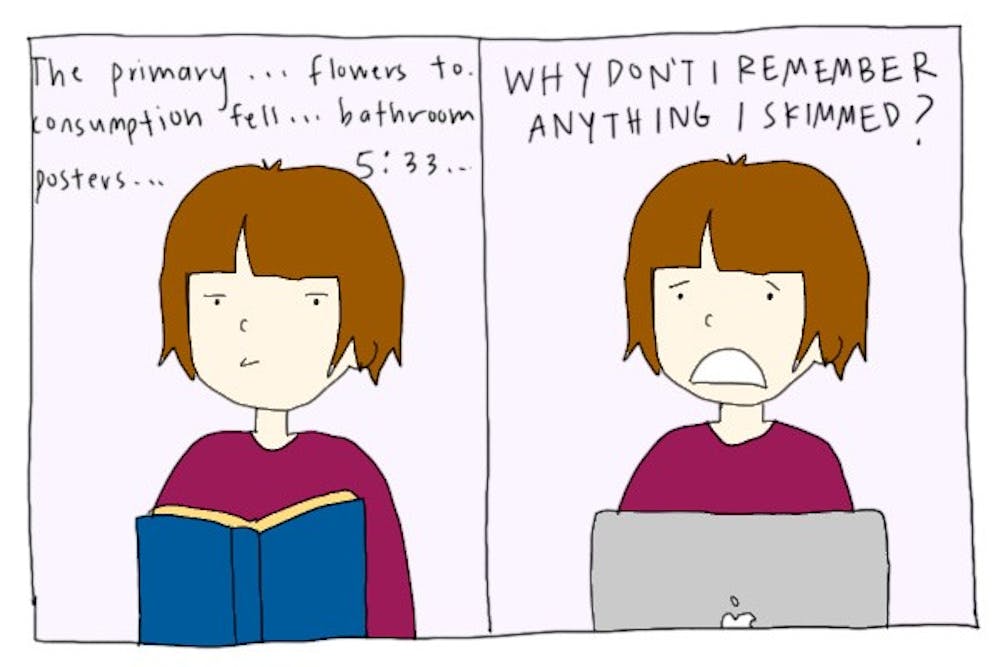As midterms end and finals approach, UP students are beginning to feel the pressure of their reading loads. Rather than take the time to carefully read the entire assignment, or even re-read it, as some professors request, many students turn to skimming, speed-reading or SparkNotes in order to finish their assigned reading.
Although skimming can be helpful in speeding up the reading process, it can also be detrimental to a student’s overall understanding of the work they are reading because they aren’t looking over every aspect of the assignment.
Some students have found skimming to be essential to success in their courses. Senior Alexander Foy has found skimming to be an extremely effective tool.
“Skimming can do a lot when reading non-literary material,” Foy said. “I’ve learned a lot of techniques to get through these mountains of reading material.”
For other students, skimming is more harmful than helpful. Senior Beau Borek has found this studying tool to be unhelpful to his academic success.
“Skim reading does not work at all in my experience,” Borek said. “I just forget everything. You can’t remember all of the ideas. They don’t flow together and just become arbitrary thoughts”.
Despite the positive effects skimming has had on Foy’s reading comprehension skills, Foy does not feel it is a strategy that can be used when reading literature.
“To make a coherent and valid argument, to pick up on anything from the sentence structure to the words to who said that word, you can’t access (these ideas) without in-depth reading,” Foy said.
Sociology professor Nick McRee understands why students must skim reading, especially during stressful times in the semester.
“I think (skimming) is more likely to happen as the semester goes on,” McRee said. “They’ve got so many competing demands, there’s certain times in the semester that it’s very difficult to satisfy them all.”
McRee believes students use skimming as a way to cope.
“One of the things they have control over is how much time they want to spend reading, but they don’t have control over when a paper is due,” McRee said.
However, professors can often tell when a student has skimmed the reading they have assigned instead of reading it fully. Philosophy professor Alejandro Santana says its a give-away when a student only has a shallow understanding of the material.
“They don’t have a firm grasp of the details, they don’t have a precise understanding of what the arguer is saying and they really can only state things in very general terms,” Santana said.
Communication studies professor Jeff Kerssen-Griep said he assigns reading for the benefit of his students, so doing the reading is essential.
“Reading is all about getting you to class prepared so that classroom time is more exciting,” Kerssen-Griep said.
Students must decide what is important to them when deciding whether to skim, according to senior Stan Thompson.
“You have to define success. If you are shooting for all A’s, (skimming) will definitely affect (your grades),” Thompson said. “You can’t get all A’s by skimming. But, if you’re balancing other aspects of life and you’re fine passing your classes with a C, you have to prioritize and skim. For some classes you have to read more, for others you have to skim.”
Kerssen-Griep, McRee and Santana all agree that skimming can be an effective studying tool when done correctly.
“The student should briefly skim the article to get a sense of where it’s going, then go back and read the article more carefully,” McRee said.
When it comes to merely reading chapter summaries instead of completing the assigned reading, Santana believes a student is wasting their time.
“If you are spending the time to read SparkNotes, just read the text,” Santana said. “SparkNotes is supposed to make things more clear, but in my experience, they aren’t very good. I’ve found some of the analysis to be very poor.”
Foy feels that reading should not be daunting for students if it’s something they are excited about.
“If you’re in the right major, a lot of the reading will be really interesting,” Foy said.








